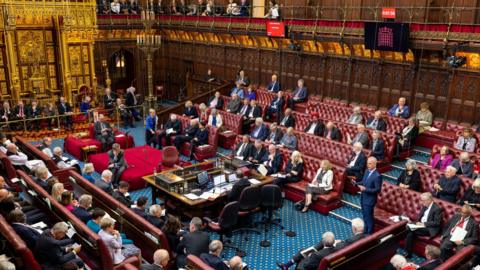Announcing the change, Cabinet Office minister Nick Thomas-Symonds told MPs that it was a "reform that this government are proud to announce as part of our wider agenda".
It follows the introduction of legislation to remove the right of hereditary peers to sit in the Lords.
That legislation is already more than halfway through its parliamentary scrutiny, with Thomas-Symonds saying he wanted it to be law as soon as possible.
"It just should not be the case, in a modern legislature, that there are places reserved for people by accident of birth," he said.
Labour pledged in their manifesto to "reform the appointments process to ensure the quality of new appointments" to the House of Lords.
The manifesto also said that because peers are appointed for life, the chamber had become too big.
Party leaders can make appointments to top-up the number of peers they have, and when Parliament is dissolved because of a general election.
Those nominated to become peers in July's dissolution honours included former prime minister Theresa May and former foreign secretary Margaret Beckett.
Prime ministers also often make a set of resignation honours, or appoint people to become ministers.
Sir Keir Starmer appointed a number of peers to become ministers on taking office, such as Attorney General Richard Hermer.
Appointments are formally made by the King, on the advice of the prime minister. Appointments are overseen by the House of Lords Appointments Commission (HOLAC), who advise the prime minister on the appropriateness of candidates.
The move follows criticism of appointments in recent years, particularly under Boris Johnson.
HOLAC rejected over half of Johnson's resignation nominations on propriety grounds.
Some of those nominations that were accepted also faced criticism, such as Charlotte Owen, a short-serving political adviser to Johnson who became the youngest peer at age 30.
In October Johnson attacked critics of the appointment, saying Baroness Owen's treatment had been "absolutely shameful" and sexist.
